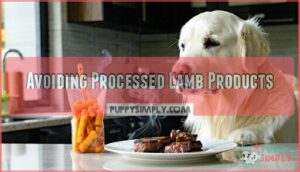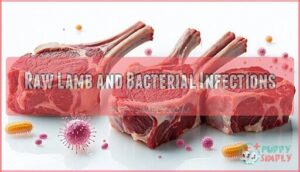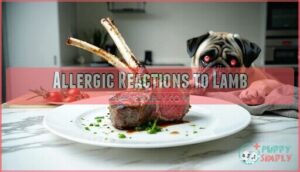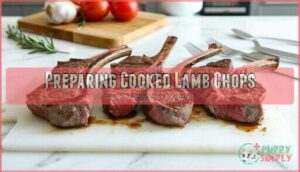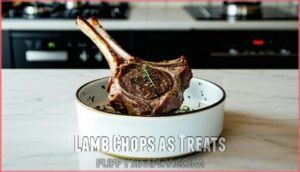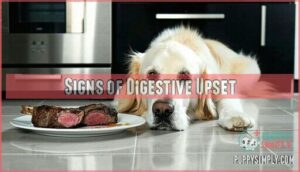This site is supported by our readers. We may earn a commission, at no cost to you, if you purchase through links.

Remove all bones, which can splinter and cause choking or internal injuries. Trim excess fat to prevent pancreatitis, and avoid seasonings like garlic and onions that are toxic to dogs.
Cook the lamb thoroughly to kill harmful bacteria.
While lamb provides excellent protein and nutrients for your furry friend, it should only be an occasional treat – not a regular meal replacement.
Many pet owners don’t realize that plain, well-cooked lamb in moderation can actually benefit dogs with certain food sensitivities when introduced properly into their diet, making it a good option for dogs with specific dietary needs, and it can be a healthy addition.
Table Of Contents
- Key Takeaways
- Can Dogs Eat Lamb
- Dogs Eat Cooked Lamb Chops
- Health Benefits of Lamb
- Safe Feeding Practices
- Risks of Feeding Lamb
- Preparing Cooked Lamb Chops
- Lamb Chops as Treats
- Common Mistakes to Avoid
- Signs of Digestive Upset
- Frequently Asked Questions (FAQs)
- Can dogs eat cooked lamb chops?
- Is it safe for dogs to consume shrimp?
- Can dogs eat lamb?
- Can a dog eat a lamb bone?
- Can a dog eat lamb fat?
- Can I give my Dog a cooked leg of lamb?
- Can a dog eat cooked lamb chops?
- What to do if a dog eats cooked lamb bones?
- Is lamb easy on a dog’s stomach?
- What kind of cooked lamb can dogs eat?
- Conclusion
Key Takeaways
- Always remove all bones from cooked lamb chops to avoid choking and internal injuries.
- Trim visible fat to lower the risk of pancreatitis and avoid toxic seasonings like garlic and onion.
- Cook lamb thoroughly to at least 145°F to eliminate harmful bacteria and serve it plain.
- Offer lamb chops as an occasional treat in small portions, monitoring for any adverse reactions.
Can Dogs Eat Lamb
You can safely feed your dog cooked lamb as it’s a nutritious protein source rich in vitamins and minerals that support muscle development and coat health.
Lamb also serves as an excellent alternative protein for dogs with food sensitivities or allergies to more common meats like chicken or beef, making it a great option for dogs with food sensitivities.
Nutritional Benefits of Lamb
Lamb offers numerous nutritional benefits for your dog.
It’s packed with high-quality protein and essential amino acids that support muscle development.
Compared to beef, lamb contains more vitamin A, calcium, magnesium, and iron.
It’s also rich in B vitamins, particularly B12.
With impressive digestibility scores of 71.5, lamb is easier on your dog’s stomach than other red meats, making it an excellent energy source for active pups.
Lamb as Novel Protein Source
For dogs with food allergies, a novel protein source can be a game-changer.
If your dog shows sensitivities to common proteins like chicken or beef, lamb offers an excellent alternative.
As a hypoallergenic option, lamb helps manage dog allergies effectively. The digestibility advantages make it easier on sensitive stomachs, regardless of breed sensitivities.
Many veterinarians recommend lamb for its long-term effects in reducing allergy symptoms.
Dogs Eat Cooked Lamb Chops
Yes, your four-legged friend can eat cooked lamb chops when prepared properly.
When serving lamb chops to dogs, always remove all bones first, as they can splinter and cause serious internal injuries.
The lamb chop size should match your dog’s breed specifics – smaller pieces for tiny breeds, slightly larger for big dogs.
For safe consumption, use cooking methods like boiling or baking without any seasonings.
Never add salt, garlic, or onions, which are toxic to dogs.
Many pet owners find that lamb for dogs provides a welcome break from chicken or beef.
If you’re wondering "**is lamb safe?
" or "can dogs have lamb chops?
" – the answer is yes, but in moderation**.
Consider lamb chops as occasional treats rather than daily meals, and always introduce new foods gradually while watching for digestive reactions.
Health Benefits of Lamb
You’ll provide your dog with essential nutrients like high-quality protein, iron, and B vitamins when you feed them properly prepared lamb.
Lamb also supports healthy skin and coat while serving as a good alternative for dogs with food sensitivities to common proteins like chicken or beef, providing essential nutrients.
High-Quality Protein Source
Consistently, lamb serves as an exceptional high-quality protein source for your furry friend.
This nutritious meat delivers essential amino acids that support muscle building and tissue repair. Your dog’s energy levels benefit from protein’s digestibility, making lamb an excellent addition to their diet.
The protein in lamb for dogs also aids in antibody production, boosting immune function. Growth support is another benefit, particularly important for puppies and active dogs needing sustained energy throughout the day.
Rich in Vitamins and Minerals
Beyond protein, cooked lamb chops offer your dog a treasure trove of essential nutrients. The meat contains high levels of iron, folate, and vitamin B12, supporting healthy blood and circulation.
Here are three key benefits of lamb’s vitamin and mineral content:
- B vitamins boost metabolism and energy production
- Vitamins A, C, and E work with selenium and zinc for immune support
- Vitamin K2 naturally inhibits histamine production
These nutrients enhance mineral absorption and overall dog nutrition. Lamb can also be a novel protein source for dogs with allergies, providing a unique benefit of lamb.
Supports Skin and Coat Health
Thanks to its omega fatty acids, lamb provides excellent support for your dog’s skin and coat health.
These nutrients reduce inflammation while promoting a shiny coat and healthy skin.
The protein quality in lamb helps repair tissue, while vitamin E sources and zinc benefits enhance overall skin condition.
When included in your dog’s diet, lamb nutrition contributes to better nutrient utilization through improved digestion, directly supporting coat shine and long-term dog health.
Safe Feeding Practices
You’ll need to cook lamb thoroughly and remove all bones before feeding it to your dog.
Always trim excess fat and avoid seasonings like garlic or onions that can harm your pet.
Cooking Lamb Thoroughly
While lamb offers excellent protein for your dog’s health, cooking it thoroughly is non-negotiable for safety.
Always heat lamb to at least 145°F (63°C) to eliminate harmful bacteria like Salmonella and E. coli.
Your dog’s safety depends on proper cooking methods – boiling, baking, or grilling work well, but avoid frying with oils.
Consider thermometer options for pets for accurate temperature readings.
Thorough cooking actually improves palatability impact and nutrient retention while making the meat easier for your pup to digest.
Avoiding Processed Lamb Products
While giving your dog lamb treats, always steer clear of processed lamb products that contain harmful additives.
Here’s a short, engaging blockquote about processed lamb products for dogs:
Processed lamb products hide dangerous additives behind tasty packaging—choose simple, clean treats for your pup’s safety.
These hidden ingredients, like preservatives and flavor enhancers, can cause digestive upset in your furry friend.
Instead, opt for safe alternatives such as plain, cooked lamb or homemade treats where you control what goes in them.
Reading labels carefully helps guarantee dog safety and prevents digestive issues from toxic ingredients.
Risks of Feeding Lamb
You’ll need to be careful when feeding lamb to your dog as it comes with specific risks that can affect their health.
Fatty cuts can cause pancreatitis while improper preparation might expose your pet to dangerous bacteria or bone splinters that could lead to serious injuries, including those from bone splinters.
High-Fat Cuts and Pancreatitis
Be careful with those fatty lamb chops – they can cause serious health problems for your dog.
Fat content in lamb is high, potentially triggering pancreatitis, a painful inflammation of the pancreas.
- Small breeds have a higher predisposition to pancreatitis
- Symptoms include vomiting, diarrhea, and abdominal pain
- Proper portion control prevents excessive fat intake
- Always trim visible fat before feeding
Seeking veterinary advice is essential if digestive issues occur after feeding lamb.
Raw Lamb and Bacterial Infections
Three deadly bacteria lurk in raw lamb that pose serious risks to your dog: Salmonella, Listeria, and E. coli.
These pathogens can cause severe food poisoning in your pet.
| Bacteria | Risk Level | Symptoms | Most Vulnerable |
|---|---|---|---|
| Salmonella | High | Vomiting, fever | Puppies |
| E. coli | Very high | Bloody diarrhea | Senior dogs |
| Listeria | Moderate | Lethargy, fever | Immunocompromised |
| Parasites | Variable | Weight loss | All dogs |
Cooking lamb thoroughly eliminates these bacterial contamination concerns completely.
Lamb can be a novel protein source for sensitive dogs.
Allergic Reactions to Lamb
While lamb was once considered hypoallergenic, it’s now a common allergen for many dogs.
Watch for these signs of dog allergies to lamb:
- Skin irritation and excessive itching
- Digestive upset like vomiting or diarrhea
- Ear infections or redness
- Respiratory issues like coughing
- Swelling around the face or paws
If these symptoms appear, consult your vet about diagnostic testing and alternative proteins for your dog’s diet.
Preparing Cooked Lamb Chops
You’ll need to trim all fat and completely remove bones from lamb chops before serving them to your dog.
Always cook the meat thoroughly without any seasonings, especially avoiding onions and garlic which are toxic to dogs.
Removing Bones and Fat
Before serving lamb chops to your dog, always remove all bones completely.
Cooked bones can splinter easily, creating serious hazards that might damage your dog’s digestive tract.
For better health benefits, trim away excess fat too.
This simple step reduces the risk of pancreatitis while still allowing your pup to enjoy safe lamb cuts.
Remember that proper portion control starts with careful preparation.
Careful preparation requires the right bone removal tools for safe and effective bone removal.
Avoiding Toxic Seasonings
When preparing lamb chops for your dog, avoid all toxic seasonings that can harm them.
Never use onion powder, garlic, salt, or other flavor enhancers common in human recipes.
These ingredients can cause serious health problems for dogs.
Stick to safe alternatives like plain, unseasoned lamb chops.
Remember that dogs enjoy the natural taste of meat without the herb dangers or spice toxicity that humans prefer.
To find alternatives, consider exploring dog-safe seasoning options.
Serving in Moderation
Despite the nutritional benefits, lamb chops should be just occasional treats in your dog’s diet.
Limit portion sizes to about 10% of their daily calorie intake to prevent weight management issues.
A small piece once or twice weekly maintains a balanced diet without overfeeding.
Remember, moderation is key when feeding dogs lamb or any rich meat.
Too much can disrupt their regular eating habits and digestive health.
Lamb can also be a novel protein source for dogs with allergies.
Lamb Chops as Treats
You can offer your dog cooked lamb chops as an occasional treat, but you’ll need to limit portions to avoid digestive upset.
Make sure you remove all bones and excess fat before serving to keep your furry friend safe and healthy.
Limiting Portion Sizes
Your dog’s portion size matters when feeding lamb chops as treats.
Limit treats to 10% of their daily calorie intake to maintain proper weight management.
Consider breed size and activity level when determining appropriate amounts – larger, active dogs can handle slightly more than smaller, sedentary ones.
For most dogs, offering just a small piece of boneless, cooked lamb once weekly helps balance their diet while providing nutritional benefits.
Monitoring for Adverse Reactions
After introducing lamb chops to your dog’s diet, watch for digestive changes like vomiting or diarrhea.
Monitor stool consistency and appetite changes closely within 24 hours. Look for allergic symptoms such as excessive scratching, redness, or swelling around the face.
Behavioral shifts like lethargy or discomfort may indicate food sensitivities. If you notice any of these signs, stop feeding lamb immediately and contact your vet for dog health advice.
Consulting a Veterinarian
While watching for reactions to lamb chops in your dog, always consult your veterinarian before making any dietary changes.
Your vet can provide personalized guidance based on your dog’s specific needs.
- Ask about appropriate portion guidance based on your dog’s size and weight
- Discuss any breed predispositions to food sensitivities
- Share concerns about possible dog allergies to lamb
- Request recipe adjustments to make lamb chops safer
- Inquire about specific lamb chop risks for your dog’s health
Common Mistakes to Avoid
You’ll want to avoid common errors when feeding lamb chops to your dog, as these mistakes can lead to serious health problems including choking hazards and digestive issues.
Even well-intentioned dog owners can accidentally put their pets at risk by leaving bones in, using harmful seasonings, or overfeeding this rich protein source.
Feeding Raw or Undercooked Lamb
While treating your furry friend is important, feeding raw or undercooked lamb is never worth the risk.
Raw meat can harbor bacterial contamination like E. coli and Salmonella, creating serious digestive issues for your dog.
Parasite risks increase with uncooked lamb, potentially leading to immune suppression and nutritional deficiencies.
Always cook lamb chops thoroughly until they reach 145°F internally to guarantee safe meat for dogs.
Giving Cooked Bones to Dogs
While it’s tempting to give your dog the leftover bones from cooked lamb chops, don’t do it!
Cooked bones pose serious splintering dangers, creating sharp fragments that can cause choking hazards or pierce your pet’s digestive tract.
Instead of risking these potential health hazards, consider safer alternatives like commercially made dental chews or homemade bone broth that provide similar benefits without endangering your furry friend, offering a healthier option.
Overfeeding Lamb Chops
Many dog owners make the mistake of overfeeding lamb chops, risking their pet’s health.
Overfeeding lamb chops can harm your dog’s health—keep portions small to avoid obesity, digestive issues, and nutrient imbalances.
Lamb chops should only make up 10% of your dog’s daily calorie intake to prevent weight gain and digestive issues.
Here are three key reasons to limit lamb chops:
- High fat content can lead to pancreatitis
- Excess calories contribute to obesity
- Nutritional imbalance from too many treats
Signs of Digestive Upset
You’ll need to watch your dog closely after feeding lamb chops, as symptoms like vomiting, diarrhea, or unusual lethargy can indicate digestive problems.
If you notice your dog refusing food or showing signs of discomfort within 24 hours of eating lamb, contact your veterinarian right away to address potential health issues.
Vomiting and Diarrhea
If your dog develops vomiting or diarrhea after eating lamb chops, you’re witnessing clear signs of gastrointestinal upset.
These stomach issues can lead to dehydration risks and electrolyte imbalance if left untreated.
Switch to a bland diet immediately and monitor the frequency of adverse reactions.
Severe or persistent vomiting might require veterinary diagnosis and medication options.
Don’t delay seeking help if symptoms continue beyond 24 hours, as this could indicate a need for urgent medical attention.
Lethargy and Loss of Appetite
Your dog’s lethargy and loss of appetite after eating lamb chops are red flags that shouldn’t be ignored.
These symptoms often indicate digestive upset or potentially more serious issues.
Watch for these warning signs:
- Reluctance to move or play for more than 24 hours
- Complete refusal of food for two consecutive meals
- Decreased water intake alongside these symptoms
Underlying causes might include food allergies to lamb or digestive issues requiring veterinary intervention.
Seeking Veterinary Care
When signs of trouble crop up after your dog eats lamb chops, don’t wait to reach out for veterinary advice. Contact your vet immediately if you notice severe symptoms.
| Emergency Symptoms | When to Call | Specialist Referrals |
|---|---|---|
| Persistent vomiting | Immediately | Internal medicine |
| Severe diarrhea | Same day | Gastroenterology |
| Breathing difficulty | Emergency | Critical care |
| Extreme lethargy | Within hours | General practice |
| Allergic reactions | Immediately | Dermatology |
Certain breed predispositions may increase sensitivity to dietary concerns from lamb, and it’s crucial to be aware of potential severe symptoms and emergency situations to ensure your dog receives the necessary care in a timely manner, including specialist referrals.
Guidance on Dietary Needs
After seeking medical attention for your furry friend, understanding their specific dietary needs becomes paramount.
Your dog’s nutritional requirements vary based on several factors that a veterinarian can help you assess.
- Calorie requirements differ based on breed specifics and size
- Life stage (puppy, adult, senior) impacts nutritional needs
- Activity levels determine daily energy requirements
- Weight management considerations affect portion control
- Existing health conditions may require specialized dog-safe foods
Working with your veterinarian provides personalized guidance that guarantees your pup’s diet supports their unique health profile, ensuring a healthy lifestyle.
Advice on Feeding Lamb Chops
When feeding lamb chops to your furry friend, always remove all bones completely to prevent choking hazards.
Trim excess fat from each chop before serving to reduce pancreatitis risk.
Keep portions small—one small piece per 10 pounds of dog weight weekly is plenty.
Never add seasonings to lamb chops for dogs.
Plain, thoroughly cooked meat is safest for your dog’s diet.
Let the meat cool before serving.
Cooked bones present a splintering and blockage risk, which is a significant concern for dog owners to be aware of complete safety.
Monitoring for Allergies and Sensitivities
When introducing lamb chops to your dog’s diet, carefully watch for allergy signs.
Check for itchiness, swelling, or skin redness after feeding.
Severe reactions like anaphylaxis require immediate veterinary care.
While lamb is considered one of the more hypoallergenic meats, some dogs develop meat allergies with symptoms including vomiting and diarrhea.
If you notice these issues, contact your vet and consider alternative protein sources.
Frequently Asked Questions (FAQs)
Can dogs eat cooked lamb chops?
Like a chef carefully preparing a gourmet meal, you’ll want to serve cooked lamb chops to your dog safely.
Yes, your furry friend can enjoy boneless, unseasoned lamb chops in moderation.
Is it safe for dogs to consume shrimp?
Yes, dogs can eat plain, fully cooked shrimp in moderation.
Remove the shell, tail, and vein first.
Shrimp offers protein and nutrients, but shouldn’t become a regular part of your dog’s diet.
Can dogs eat lamb?
By jove, dogs can safely eat lamb.
It’s a protein-rich meat that supports muscle development and contains essential vitamins.
You’ll want to cook it thoroughly, remove bones, and trim excess fat before serving it.
Can a dog eat a lamb bone?
No, dogs should never eat lamb bones.
Cooked bones can splinter and cause choking or internal injuries.
Raw bones carry bacteria risks.
Stick to boneless lamb meat for a safer protein option.
Can a dog eat lamb fat?
Ever wondered what happens when your pup eyes that fatty lamb trim?
Dogs shouldn’t eat lamb fat as it can cause pancreatitis and digestive upset.
Small amounts might be tolerated, but it’s best avoided altogether.
Can I give my Dog a cooked leg of lamb?
Cooked leg of lamb is safe for your dog if you remove all bones, trim excess fat, and avoid seasonings.
Serve small portions as an occasional treat, not as a regular meal replacement.
Can a dog eat cooked lamb chops?
Yes, your dog can eat cooked lamb chops safely.
Just remember to remove all bones, trim excess fat, and avoid seasonings.
Serve in small, bite-sized pieces as an occasional treat rather than a daily meal.
What to do if a dog eats cooked lamb bones?
If your dog eats cooked lamb bones, check for choking or signs like vomiting, diarrhea, or pain.
Cooked bones can splinter and cause harm.
Contact your vet immediately for advice and possible treatment.
Is lamb easy on a dog’s stomach?
Lamb, with its digestible proteins and essential nutrients, is often gentle on a dog’s stomach.
However, fatty cuts or sudden introduction can upset digestion.
Always introduce it gradually and stick to lean, cooked portions.
What kind of cooked lamb can dogs eat?
Lean lamb meat, cooked without seasoning, is safe for dogs.
Avoid bones, excess fat, and harmful spices like garlic or onion.
Small portions work best as an occasional treat, ensuring your pup stays happy and healthy!
Conclusion
Did you know lamb is one of the top three novel proteins recommended for dogs with sensitivities?
Cooked lamb chops can be a safe treat for your dog if you remove all bones, trim fat, and avoid harmful seasonings.
Always cook the lamb thoroughly to eliminate bacteria and serve it in moderation to prevent health issues.
While it’s nutritious and protein-rich, lamb chops should never replace balanced dog food.
Monitor your dog for reactions, and consult your vet if unsure.





